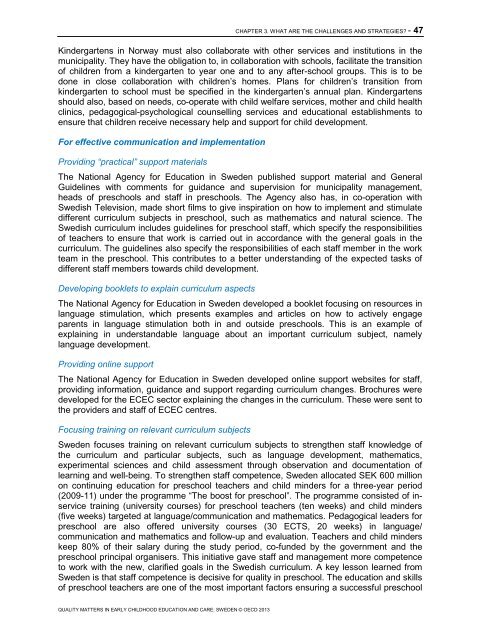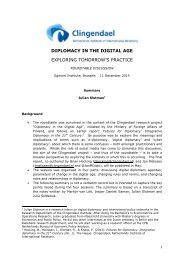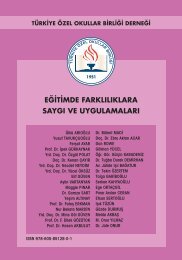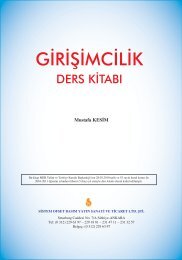SWEDEN%20policy%20profile%20-%20published%2005-02-2013
SWEDEN%20policy%20profile%20-%20published%2005-02-2013
SWEDEN%20policy%20profile%20-%20published%2005-02-2013
Create successful ePaper yourself
Turn your PDF publications into a flip-book with our unique Google optimized e-Paper software.
QUALITY MATTERS IN EARLY CHILDHOOD EDUCATION AND CARE: SWEDEN © OECD <strong>2013</strong><br />
CHAPTER 3. WHAT ARE THE CHALLENGES AND STRATEGIES? - 47<br />
Kindergartens in Norway must also collaborate with other services and institutions in the<br />
municipality. They have the obligation to, in collaboration with schools, facilitate the transition<br />
of children from a kindergarten to year one and to any after-school groups. This is to be<br />
done in close collaboration with children’s homes. Plans for children’s transition from<br />
kindergarten to school must be specified in the kindergarten’s annual plan. Kindergartens<br />
should also, based on needs, co-operate with child welfare services, mother and child health<br />
clinics, pedagogical-psychological counselling services and educational establishments to<br />
ensure that children receive necessary help and support for child development.<br />
For effective communication and implementation<br />
Providing “practical” support materials<br />
The National Agency for Education in Sweden published support material and General<br />
Guidelines with comments for guidance and supervision for municipality management,<br />
heads of preschools and staff in preschools. The Agency also has, in co-operation with<br />
Swedish Television, made short films to give inspiration on how to implement and stimulate<br />
different curriculum subjects in preschool, such as mathematics and natural science. The<br />
Swedish curriculum includes guidelines for preschool staff, which specify the responsibilities<br />
of teachers to ensure that work is carried out in accordance with the general goals in the<br />
curriculum. The guidelines also specify the responsibilities of each staff member in the work<br />
team in the preschool. This contributes to a better understanding of the expected tasks of<br />
different staff members towards child development.<br />
Developing booklets to explain curriculum aspects<br />
The National Agency for Education in Sweden developed a booklet focusing on resources in<br />
language stimulation, which presents examples and articles on how to actively engage<br />
parents in language stimulation both in and outside preschools. This is an example of<br />
explaining in understandable language about an important curriculum subject, namely<br />
language development.<br />
Providing online support<br />
The National Agency for Education in Sweden developed online support websites for staff,<br />
providing information, guidance and support regarding curriculum changes. Brochures were<br />
developed for the ECEC sector explaining the changes in the curriculum. These were sent to<br />
the providers and staff of ECEC centres.<br />
Focusing training on relevant curriculum subjects<br />
Sweden focuses training on relevant curriculum subjects to strengthen staff knowledge of<br />
the curriculum and particular subjects, such as language development, mathematics,<br />
experimental sciences and child assessment through observation and documentation of<br />
learning and well-being. To strengthen staff competence, Sweden allocated SEK 600 million<br />
on continuing education for preschool teachers and child minders for a three-year period<br />
(2009-11) under the programme “The boost for preschool”. The programme consisted of inservice<br />
training (university courses) for preschool teachers (ten weeks) and child minders<br />
(five weeks) targeted at language/communication and mathematics. Pedagogical leaders for<br />
preschool are also offered university courses (30 ECTS, 20 weeks) in language/<br />
communication and mathematics and follow-up and evaluation. Teachers and child minders<br />
keep 80% of their salary during the study period, co-funded by the government and the<br />
preschool principal organisers. This initiative gave staff and management more competence<br />
to work with the new, clarified goals in the Swedish curriculum. A key lesson learned from<br />
Sweden is that staff competence is decisive for quality in preschool. The education and skills<br />
of preschool teachers are one of the most important factors ensuring a successful preschool








